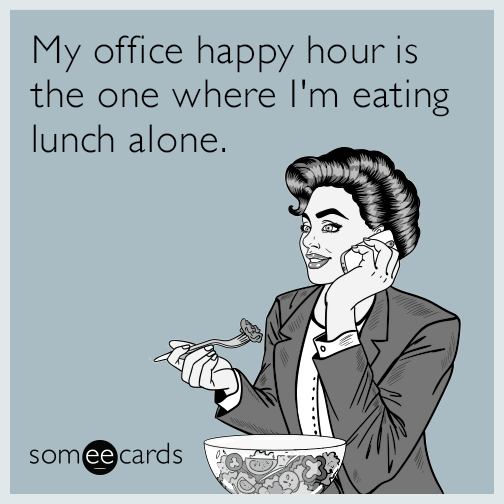Is being laid-off a good thing?
Phones ringing, numbers flashing across four screens, hundreds of people rushing about. Team members watching the morning news in the background to get ready for the day ahead. If the phrase “high-pressure environment” comes to mind as you are reading this, then you are picturing this correctly.
It had been a trying two years. Reorganizations, restructurings, rehashings, retoolings, and the list of “re” words continues. A new manager was brought in to trim the workforce. People with families, kids, established lives had their worlds up-ended. Health issues and leave of absences became the norm. After struggling with crippling anxiety, mixed bouts of depression, and nights of self-medicating for two years, I knew something had to give. This was starting to threaten my daily life and health. I just needed to hang on another year so I can save for a car, I told myself.
Then I got the message. “Come to meeting room 103 please.”, my manager wrote. HR was waiting in the room and the moment I sat down it was said straight. “Today will be your last day at Clearwater. Take a moment-- gather your belongings. Say your goodbyes to your team members and then you will be escorted out of the building. Your desk contents will be shipped to you.” Apparently, HR and Chris Harrison from ABC’s The Bachelor read off of the same script.
Ironically, I felt incredible. Practically bouncing as I walked out of the building to my apartment. I had finally been released from this toxic environment. I couldn’t ignore however that I had this salty taste in my mouth the rest of the day. Medication/diet changes, doctor’s appointments, and meditation seminars had gotten me to this point. They were attempts to solve a problem that needed wholistic change, not a change of attitude. I knew something had to give. The situation had become unsustainable.
Just like that, the next chapter of my life had just been opened. I knew I needed change but what change?
Laid-off or Fired? What’s the difference?
While most people use these two terms as synonyms, they mean very different things. When someone is fired, they have either broken company policy, violated city, state, or federal laws, or wronged the company in some other grave and/or criminal fashion. This is a serious offense and can affect your potential for employment. When you are fired, you may be denied unemployment benefits by the State. [Editor’s note: There are certain cases for when you may collect unemployment benefits if you were fired. Read more here]
When you are laid-off, you have missed company performance expectations of yourself or were let-go due to company restructuring and reorganization. This form of being let-go entitles you to claim unemployment.
“Being laid-off allows you a fresh start. It grants you options and gives you time to regroup, especially if you know your heart wasn’t in your current job.”
How can you say that being laid-off is a good thing?
After a change in income from a six-figure salary to thirty-seven thousand dollars in one year, there is no doubt that your question is legitimate. There are different implications depending on what kind of financial obligations you have in your life. But I ask you to zoom out and look at the bigger picture. Being laid-off allows you a fresh start. It grants you options and gives you time to regroup, especially if you know your heart wasn’t in your current job.
If I don’t want to do this for the rest of my life, that is, be miserable and make lots of money just so my kids can have smartphones at five years old, I have to focus my energy elsewhere.
I think I’m going to be laid-off, what can I do?
Sometimes, your relationship with your employer may not be salvageable. Regardless of how much effort and work you put in to show your managers you are “worth it”, there may be times where the company may just be taking advantage of your efforts and still plan on letting you and others go. If I can’t control my job security what can I control?
It is absolutely crucial that you initiate your safety protocols.
Safety Procedures & Items to Keep in Mind
Save at least 6-12 months of your living expenses 25%-50% of your salary for that duration of time. Health insurance is offered by COBRA for up to 18 months. COBRA allows you to keep you previous employers benefit plan for 18 months as long as you are willing to pay out of pocket for the coverage. Your HR department typically offers you more information should this be relevant to you. Make sure to ask your HR team if it is not discussed with you and you are in a room about to lose your job and benefits.
Polish your resume and LinkedIn profile.
Make sure to keep in touch with your network. A coffee/drink or lunch will do just fine to start. This can include discussions with former managers, coworkers or even career counselors.
Prioritize your mental and physical health. Make sure to go to the gym, get plenty of rest and eat healthy. If you need to see a psychiatrist/psychologist/physician during this time, do not hesitate to do so. Do not think you are weak if you do. You are strong because you recognize you need assistance to ensure your success. Many companies also offer internal therapists should that fit your needs better.
Create a 1, 2, and 5-year plan for yourself to help organize your thoughts about what you want to do next.
Spend time with family and friends. It’s important to have balance in your life and to remind yourself that your work does not define you.
Maintain perspective. Many people today are fortunate enough to foster meaningful friendships, mentors and even lifelong partners at their work. This should be far from your expectation. Your work may not be fulfilling. You may want to look elsewhere to fill that void in your life. If you get anything additional above your salary at work, be grateful. This sounds dire but it is important to keep in mind. Your company cares about the bottom line, not your feelings.
Enjoy the job as much as you can while you are there. Whether it’s your colleagues, managers, or clients. Try to find something in your day that you enjoy to lift your spirts while you are planning or waiting on your next move.
There may come a time where you need to choose between morality, altruism, and wealth. David Brooks of the NY Times has an opinion article entitled The Power of Altruism. I highly recommend reading it.
Live a balanced life. I know its cliché, but life is short and whatever doesn’t kill you really will make you stronger. You just don’t want to test the line of what will kill you. You need to recognize any danger to yourself as soon as possible if needed.
Why don’t I just leave on my own terms?
This is the ideal outcome. Leave on your own and have employment lined up for which you are roaring to dive into. The average millennial will have 4-6 careers in their lifetime. However, life sometimes throws you a curveball. Do you have debt or expenses that need to be paid you originally planned on having income for? Remember that when you leave on your own or when you are fired you are not entitled to unemployment benefit income. Only when you are laid-off is this offered as a benefit to the individual by the State.
What do I do now?
Better yet, I’ll tell you what you should not do. When going through a traumatic experience or difficult relationship its very easy to dwell on what you could’ve done better and replay scenes over and over in your head. It took me months to come to this realization. This will not help you move forward. In fact, in most circumstances it is the only thing holding you back.
Move forward. Everything is a learning experience. Take some time away for a bit and ask yourself what you want to do with your professional life. Did you feel unfulfilled? Did you feel that you did not have enough balance? Did you want to develop new skills or sharpen your existing skills? Whatever it is, set up a plan that works for your life and that you would be comfortable doing day in and day out. Having a plan is the most important thing here. You’ll want to keep some semblance of a structured day while you are between jobs so you don’t waste time.
THE Takeaway
Being laid-off may sound scary, nerve-wracking, impossible, unrealistic, or very probable depending on who you are. It’s vital to take care of yourself during this challenging time in your life by using the tools above to start. This topic could be a book in and of itself, but this article has provided you with some basic guidelines for how to proceed on your journey. I did end up getting that car by the way. Golden parachutes and luck can go a long way. Remember! Victory loves preparation.
Guest Writer: Anonymous
Note: The opinions shared in this piece are based on a personal experience and may not apply to all situations.





